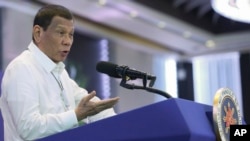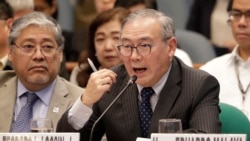The Philippines has informed the United States that it is ending a security agreement that permits American forces to train in the country.
A spokesman for Philippine President Rodrigo Duterte said U.S. officials were informed of the decision on Tuesday. The ending of the agreement is set to become official in 180 days unless both sides agree to continue it.
The 1998 agreement sets rules for U.S. military forces operating in the Philippines. The two nations hold many joint military exercises and training activities throughout the year.
Presidential spokesman Salvador Panelo told reporters the Philippines was withdrawing from the agreement to permit more independent relations with other countries.
Philippine Foreign Secretary Teodoro Locsin Jr. said on Twitter that President Duterte ordered the end of the agreement.
In a statement, the U.S. Embassy in Manila called the move “a serious step with significant implications for the U.S.-Philippines alliance.” It said U.S. officials “will carefully consider how best to move forward to advance our shared interests.”
The embassy statement added: “Our two countries enjoy a warm relationship, deeply rooted in history. We remain committed to the friendship between our two peoples.”
Duterte has often criticized U.S. security policies while praising those of China and Russia, even though the Philippine military enjoys close historic ties with American forces.
Duterte first warned of ending the deal in 2016 after a U.S. aid agency put a hold on money for anti-poverty projects in the Philippines. He then repeated the threat in a speech last month.
The speech came after Ronald Dela Rosa, the former national police chief who is now a senator, said the US had cancelled his visa but did not tell him why. Philippine officials view the cancellation as a punishment for Dela Rosa's leadership of an anti-drug campaign Duterte launched in 2016.
The government campaign has killed thousands of mostly poor drug suspects. It has drawn criticism from the United States, other Western nations and human rights groups.
Duterte decided to end the security agreement even after military generals and his defense and foreign ministers defended it during a Senate hearing last week.
During the hearing, Locsin warned that canceling the agreement would harm Philippine security and could increase aggression in the disputed South China Sea. A U.S. military presence in the waterway has been seen as an important balance to China, which claims most of the South China Sea as its territory.
At the hearing, Locsin said the agreement clearly provided security economic benefits to both sides. He proposed seeking changes to improve the agreement rather than ending it.
I’m Bryan Lynn.
Bryan Lynn wrote this story for VOA Learning English, based on reports from The Associated Press, Reuters and Agence France-Presse. Kelly Jean Kelly was the editor.
We want to hear from you. Write to us in the Comments section, and visit our Facebook page.
_____________________________________________________________
Words in This Story
significant – adj. important or noticeable
implication – n. a result or effect that seems likely in the future
advance – v. move forward
commit – v. to make a strong decision to do something











